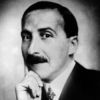Stefan Zweig

Stefan Zweig
Stefan Zweigwas an Austrian novelist, playwright, journalist and biographer. At the height of his literary career, in the 1920s and 1930s, he was one of the most popular writers in the world...
NationalityAustrian
ProfessionWriter
Date of Birth28 November 1881
CountryAustria
ambition accomplishment coincidence
Only ambition is fired by the coincidences of success and easy accomplishment.
hero years accomplishment
When it looks at great accomplishments, the world, bent on simplifying its images, likes best to look at the dramatic, picturesquemoments experienced by its heroes.... But the no less creative years of preparation remain in the shadow.
advice events flow generation influence life next offer power
The life of our generation is now set. We do not have the power to influence the flow of events, and no right to offer advice to the next generation.
real women heart
Only a numskull is pleased at being a so-called "success" with women, only a dunderhead is puffed up by it. A real man is much more likely to be dismayed at realizing that a woman has lost her heart to him when he can't reciprocate her feelings.
war men whole
On the whole, more men had perhaps escaped into the war than from it.
life regret years
In history as in human life, regret does not bring back a lost moment and a thousand years will not recover something lost in a single hour.
love heart passion
In my youth and comparative inexperience I had always regarded the yearning and pangs of love as the worst torture that could afflict the human heart. At this moment, however, I began to realize that there was another and perhaps grimmer torture than that of longing and desiring: that of being loved against one's will and of being unable to defend oneself against the urgency of another's passion; of seeing another human being seared by the flame of her desire and of having to look impotently, lacking the power, the capacity, the strength to pluck her from the flames.
love passion suffering
He who is himself crossed in love is able from time to time to master his passion, for he is not the creature but the creator of his own misery; and if a lover is unable to control his passion, he at least knows that he is himself to blame for his sufferings. But he who is loved without reciprocating that love is lost beyond redemption, for it is not in his power to set a limit to that other's passion, to keep it within bounds, and the strongest will is reduced to impotence in the face of another's desire.
real history intellectual
But in the intellectual world, there is room for all opposing forces: even that which never appears victorious in the real world continues to be effective as a dynamic force (in the intellectual world) and precisely the unfulfilled ideals prove to be the most invincible.
art drama fate
The Battle of Waterloo is a work of art with tension and drama with its unceasing change from hope to fear and back again, changewhich suddenly dissolves into a moment of extreme catastrophe, a model tragedy because the fate of Europe was determined within this individual fate.
happiness past profound
States of profound happiness, like all other forms of intoxication, are apt to befuddle the wits; intense enjoyment of the present always makes one forget the past.
strong fear long
Something indefinite is always worse than something definite, a strong fear that doesn't last very long is easier than one that's nebulous but doesn't go away.
people stupidest
Why is it that the stupidest people are always the most good-natured?
men servant-of-god servant
It is better to be the servant of God than the ruler of men.